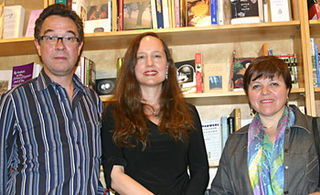
Elsa Cross
Encyclopedia

Mexican people
Mexican people refers to all persons from Mexico, a multiethnic country in North America, and/or who identify with the Mexican cultural and/or national identity....
writer perhaps best known for her poetry. She has also published translations, philosophical essays and is known as an authority on Indian philosophy.
She has a doctorate in Philosophy and Letters from Universidad Nacional Autónoma de México (UNAM) and is currently a professor in that Faculty.
In 1990, she was awarded the Premio Nacional de Poesía Aguascalientes for her book of poems El diván de Antar. She is also the recipient of the Premio Nacional de Poesía Jaime Sabines (in 1992).
According to Octavio Paz
Octavio Paz
Octavio Paz Lozano was a Mexican writer, poet, and diplomat, and the winner of the 1990 Nobel Prize for Literature.-Early life and writings:...
, Elsa Cross is one of the most personal voices in recent Latin-American poetry. Her work, already considerable, includes some of the most perfect poems of the last generation of Mexican writers. I say voice and not poetic writing since poetry, although written, must always be spoken. Two opposing notes reconcile harmoniously in Elsa Cross: the complexity of her thought and the clarity of her diction.
Published works
- Naxos, Ollín, México, UFSIA: MAG-MEX-B 7813, (1966)
- Amor el más oscuro (1969)
- Peach Melba, Sierra Madre, Series: Poesía en el mundo, (1970)
- La dama de la torre, entitled La canción de Arnaut, Joaquín Mortiz, México, (poetry prize in the concurso nacional de la juventud 1971, 1972), (1972)
- Tres poemas (Colección Cuadernos de poesía), UNAM, ISBN 978-968-5800-91-4, (1981)
- Bacantes/Bacchae, Artífice Ediciones, México, ISBN 978-968-6654-05-9, (1982)
- Canto malabar, Fondo de Cultura Económica, ISBN 978-968-16-2679-2, (1987)
- Pasaje de fuego, D.F., Boldó i Climent, México, 2 ed., ISBN 978-968-6109-16-0, (1987)
- Espejo al sol (poemas 1964-1981), Secretaría de Educación Pública, ISBN 978-968-29-2057-8, (1989)
- El diván de Antar, JM, ISBN 978-968-27-0390-4, (1990)
- Jaguar, Ediciones Toledo, México, ISBN 978-968-6332-24-7, (1991)
- Casuarinas (El ala del tigre), UNAM, Coordinación de Humanidades, Dirección General de Publicaciones, ISBN 978-968-36-2020-0, (1992)
- Moira, Gobierno del Estado, Instituto Chiapaneco de Cultura, ISBN 978-968-6492-87-3, (1993)
- Poemas de la India, UNAM, (1993)
- Urracas, Editorial Aldus, ISBN 978-968-6830-45-3, (1995)
- De lejos viene, de lejos va llegando, Biblioteca del ISSSTE, ISBN 978-968-825-350-2, (1999)
- Los sueños. Elegías, Conaculta, México, Práctica Mortal, ISBN 978-970-18-3990-4, (2000)
- Poemas escogidos 1965-1999, UNAM, ISBN 978-968-36-8018-1, (2000)
- Ultramar (Letras Mexicanas), Fondo De Cultura Economica USA, ISBN 978-968-16-6562-3, (2002)
- El vino de las cosas: ditirambos, Conaculta, México, ISBN 978-968-411-588-0, (2004)
- La realidad transfigurada en torno a las ideas del joven Nietzche, UNAM, (1985)
- Canto por un equinoccio de Saint John Perse, Cuadernos de Humanidades, UNAM-INBA, (1980)
- El himno de las ranas, Lectorum Pubns (Juv), ISBN 978-968-494-052-9, (1992)
- Los DOS Jardines: Mistica y Erotismo En Algunos Poetas Mexicanos (La Centena), Ediciones Sin Nombre, ISBN 978-970-35-0291-2, (2003)
Her poetry
Speaking of her poetry, she said it is the bond of the internal with the external. In one direction or another, for me poetry always bridges that inside with that of the outside, is the way of passing from one to the other of these spaces, but which unites them. The internal only can expressed when reflected in that outside -that necessary knot-, the outside can be a mirror or vice versa.Extract from Triptico, 1998
II. Reflejo en una esfera- Desde su centro,
- la esfera de una lámpara
-
-
- invierte las formas,
-
-
- punto de fuga:
- se comban los bordes metálicos,
- el contorno de la ventana,
- el árbol de la rosa morada
-
-
- resbalan hacia el vacío.
-
- Noche acumulada en las paredes.
- Sin mediar palabras,
- hundidos de golpe en esos cálices–
- zumos de hierba
-
-
- en la abrasión oscura,
-
- clima intemperado.
- Oh largos besos,
- mano que recorre el muslo
-
-
- como una playa,
-
- el rizo en la ingle–
-
-
- (oh cuerpo del verano).
-
- Y detenidos en esa floración
-
-
- como insectos,
-
- los pensamientos.
- Al alba el lugar desconocido,
-
-
- flores moradas.
-
- La lámpara quiebra sus reflejos,
- como afuera el sol ya se refracta
-
-
- sobre las superficies.
-
- Los objetos pasan como un río:
- voces que piden ser oídas,
-
-
- irrumpen en la mente.
-
- Intocada en lo que la desborda,
- la conciencia es un espejo:
-
-
- filo de escama,
-
- aspa que roza un ala en movimiento.
- Ellos se dejan
- sin volver la vista atrás,
- sin preguntarse sus nombres.
- Y la zona de nadie,
- el entrecielo recorrido en el delirio
-
-
- inexistente ahora,
-
- ya poblado del tráfago innoble
-
-
- de la calle.
-

